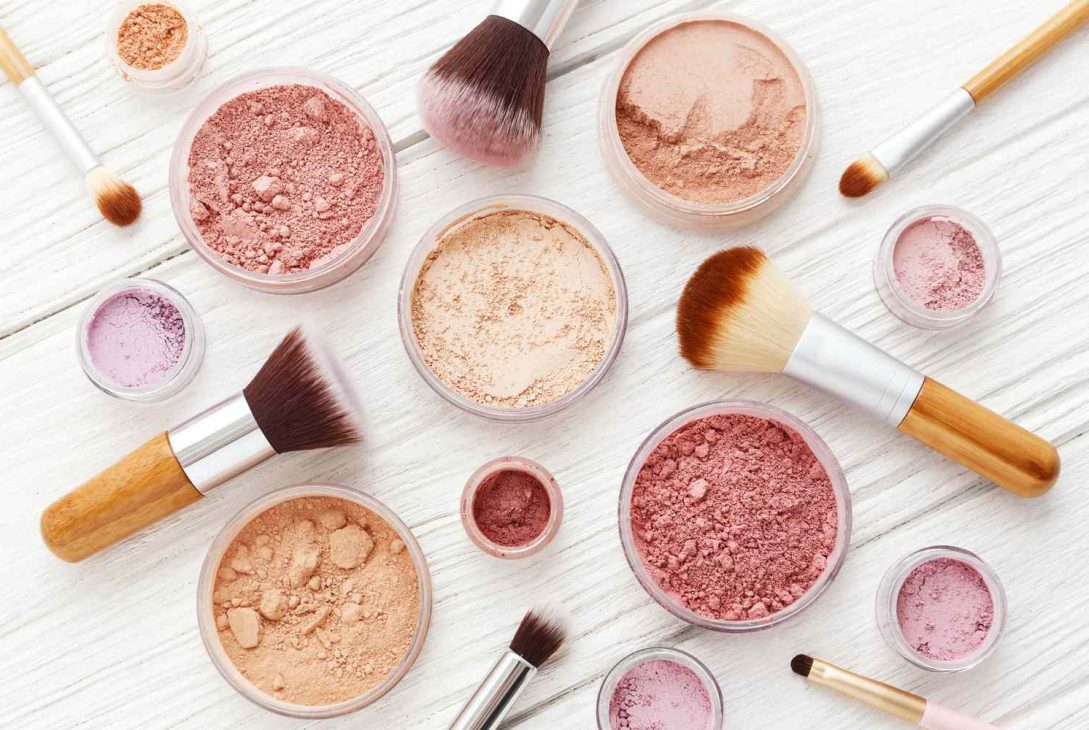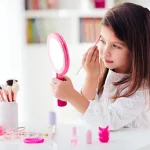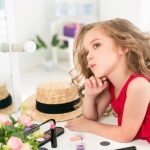Welcome, to a fascinating discussion on a topic that’s both intriguing and relevant in today’s world, the psychological impact of makeup on kids. In a society where cosmetics play a significant role in self-expression and identity, it’s crucial to explore how this cultural phenomenon affects the youngest members of our community. From playful experimentation to potential psychological implications, let’s dive into this colorful world and uncover some insightful perspectives and advice.
The Psychological Impact of Makeup on Kids: Insights and Advice
1. Understanding Makeup as a Form of Expression:
Makeup has long been celebrated as a means of self-expression and creativity for individuals of all ages. For adults, it often serves as a tool for enhancing features or conveying personal style. However, for children, the relationship with makeup is typically more exploratory and imaginative. From dabbling in mom’s lipstick to experimenting with face paint, the psychological impact of makeup on kids can vary widely depending on factors such as age, environment, and parental influence.
Read Also: How Does Makeup Affect Children?
2. Exploring the Playful Side:
For many children, playing with makeup is akin to engaging in dress-up or imaginative play. It offers them the opportunity to experiment with different looks, personas, and roles, fostering creativity and self-discovery in the process. This playful exploration can boost confidence and encourage a sense of autonomy as kids experiment with their appearance in a safe and supportive environment.
However, it’s essential to recognize that the psychological impact of makeup on kids isn’t always purely positive. As children become increasingly exposed to societal beauty standards through media and advertising, they may start to internalize unrealistic ideals regarding appearance. This can lead to feelings of inadequacy or pressure to conform to certain beauty norms, even at a young age.
Read Also: 10 FAQs About Kids and Makeup: Experts Answer
3. Navigating Parental Influence:
As parents, caregivers, or mentors, our attitudes and behaviors regarding makeup can significantly influence how children perceive and engage with cosmetics. It’s essential to approach this topic with sensitivity and open communication, recognizing that each child may have different preferences and comfort levels when it comes to experimenting with makeup.
Encouraging a healthy attitude towards beauty involves fostering self-esteem, body positivity, and a focus on inner qualities rather than external appearance alone. By emphasizing traits such as kindness, intelligence, and creativity, we can help children develop a well-rounded sense of self-worth that isn’t solely reliant on physical attributes.
Read Also: Easy Steps on How to Make a Kid Look 100 Years Old [2024]
4. Addressing Concerns:
Despite its playful nature, makeup use among children can raise valid concerns regarding the psychological impact of makeup on kids. Excessive focus on appearance at a young age may contribute to issues such as body dissatisfaction, low self-esteem, and even the premature sexualization of children. It’s essential for caregivers to monitor makeup use and intervene if they observe any signs of distress or unhealthy behavior.
Moreover, discussions surrounding consent and boundaries are crucial when it comes to makeup experimentation. Children should feel empowered to explore their interests and preferences without feeling pressured to conform to external expectations or peer pressure.
Read Also: How to do old person makeup on kid?
Practical Tips and Advice:
So, how can we navigate the psychological impact of makeup on kids while fostering a healthy attitude towards beauty and self-expression? Here are some practical tips and advice for parents, caregivers, and educators:
- Lead by Example: Demonstrate a positive relationship with makeup by using it as a form of self-expression rather than a means of conforming to beauty standards.
- Encourage Open Communication: Create a safe space for children to ask questions, express concerns, and share their thoughts on makeup and beauty.
- Set Boundaries: Establish clear guidelines regarding when and how makeup can be used, taking into account factors such as age, occasion, and personal preference.
- Focus on Inner Qualities: Emphasize the importance of kindness, empathy, and personal achievements over external appearance alone.
- Promote Self-Confidence: Encourage children to develop confidence in their natural appearance while also respecting their desire to experiment with makeup in a healthy and age-appropriate manner.
Read Also: How to do Old Age Stage Makeup?
Does Makeup Have a Psychological Effect?
Now, you might be wondering, does slapping on some lipstick or dabbing on eyeshadow actually mess with our heads? Well, buckle up, because the answer might surprise you! Makeup isn’t just about looking pretty; it’s about expressing ourselves and feeling confident in our own skin. So yeah, makeup can totally have a psychological effect – but whether it’s positive or negative depends on how we use it!
Watch Also: What are the psychological effects of being a kid influencer?
What is the Psychology of Too Much Makeup?
Okay, let’s talk about the elephant in the room: too much makeup. We’ve all seen those folks who look like they dunked their faces in a bucket of paint, right? Well, the psychology behind too much makeup is pretty fascinating. Sometimes, people use makeup as a mask to hide their insecurities or to fit in with what society thinks is “beautiful.” But here’s the thing – true beauty shines from within, not from layers of foundation!
Read Also: How Do You Use Makeup App for Beginners? A Step by Step Guide For Kids
What is Makeup in Psychology?
In the wacky world of psychology, makeup is like a colorful puzzle piece that fits into the bigger picture of who we are. It’s not just about covering up blemishes or making our eyes pop; it’s about self-expression, creativity, and yes, even a little bit of magic! Makeup can tell the world a story about who we are and what we’re feeling – whether we’re feeling bold and adventurous or sweet and subtle.
Does Makeup Affect Self Esteem?
Ah, self-esteem – that magical ingredient that makes us feel like we can conquer the world! So, does makeup affect it? Well, the jury’s still out on that one. For some folks, putting on makeup can give them a confidence boost and make them feel like a million bucks. But for others, relying too much on makeup for validation can actually chip away at their self-esteem. Remember, true confidence comes from loving yourself just the way you are – makeup or no makeup!
Read Also: Which App Is Used For Makeup?
What is an Example of Psychological Makeup?
Ever heard of the saying, “fake it till you make it”? Well, that’s basically the idea behind psychological makeup. It’s when we use makeup to project a certain image or attitude to the world, even if it’s not how we truly feel inside. For example, putting on a bold red lipstick might make us feel more confident and powerful, even if we’re secretly quaking in our boots!
Does Beauty Affect Mental Health?
Beauty may be in the eye of the beholder, but can it actually affect our mental health? Turns out, it can! In a world obsessed with Instagram filters and Photoshop, it’s easy to get caught up in unrealistic beauty standards. This can lead to issues like body dissatisfaction, low self-esteem, and even anxiety or depression. That’s why it’s so important to remember that beauty comes in all shapes, sizes, and colors – and it starts from within!
Read Also: 10 Makeup Games and Apps for Kids [2024]
Is Makeup Sexualizing?
Okay, let’s tackle this one head-on: is makeup sexualizing? Well, it can be, but it doesn’t have to be! Makeup is all about how we choose to use it. If we’re using it to embrace our sexuality and feel empowered, then go ahead and rock that sultry smokey eye! But if we’re using it because we feel pressured to look a certain way or please others, then it might be time to rethink our makeup game plan.
What is the Psychology of Lipstick?
Ah, lipstick – the cherry on top of our makeup sundae! But did you know that the psychology behind lipstick is pretty darn fascinating? For centuries, lipstick has been associated with power, confidence, and yes, even seduction. That’s because our lips are one of the most expressive parts of our face, and a swipe of lipstick can make us feel like we’re ready to take on the world – one pout at a time!
Read Also: Age Appropriate Makeup: When Is It Okay for Kids?
What are the Psychological Benefits of Beauty?
Believe it or not, there are actually some pretty sweet psychological benefits to embracing our inner beauty guru. For starters, experimenting with makeup can boost our creativity and self-expression, making us feel like the fabulous artists we truly are. Plus, when we feel confident and comfortable in our own skin, it can have a ripple effect on other areas of our lives, from school to friendships to chasing our dreams!
What is the Psychology of Beauty?
Ah, the million-dollar question: what is the psychology of beauty? Well, it’s a complex cocktail of culture, biology, and personal experiences, shaken up with a healthy dose of societal norms and expectations. In other words, beauty is subjective – what one person finds attractive, another person might not. So, instead of chasing after someone else’s idea of beauty, why not embrace what makes you uniquely you?
Read Also: Makeup Hygiene and Safety Tips for Kids
Conclusion:
In conclusion, the psychological impact of makeup on kids is a multifaceted topic that warrants thoughtful consideration and proactive guidance from caregivers and educators alike. While makeup can be a source of fun, creativity, and self-expression for children, it’s essential to be mindful of the potential implications it may have on their self-esteem and body image.
By fostering open communication, setting boundaries, and promoting a healthy attitude towards beauty, we can empower children to explore their individuality while cultivating a strong sense of self-worth that extends far beyond the surface. Together, let’s embrace the colorful world of makeup with wisdom, humor, and a touch of magic. After all, beauty truly begins from within.
Read Also: How to do Traditional Makeup Looks for Kids




[…] Read Also: The Psychological Impact of Makeup on Kids: Insights and Advice […]
[…] Read Also: The Psychological Impact of Makeup on Kids: Insights and Advice […]
[…] Read Also: The Psychological Impact of Makeup on Kids: Insights and Advice […]
[…] Read Also: The Psychological Impact of Makeup on Kids: Insights and Advice […]
[…] Read Also: The Psychological Impact of Makeup on Kids: Insights and Advice […]
[…] Read Also: The Psychological Impact of Makeup on Kids: Insights and Advice […]